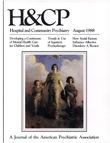National Trends in Use of Psychotherapy in Psychiatric Inpatient Settings
Abstract
The use of individual, family, and group psychotherapy at a national sample of state and county mental hospitals, private psychiatric hospitals, and psychiatric services in nonfederal general hospitals in 1975 and in 1980 or 1981 was studied. Patients with organic or alcohol-related disorders were generally less likely to receive psychotherapy than were those with schizophrenia. Patients' educational level, gender, or race did not appear to influence the use of psychotherapy, but older patients were less likely to receive psychotherapy, particularly group or family therapy. During the study period, the percentage of patients receiving psychotherapy at nonfederal public general hospitals rose dramatically and by 1981 was almost equal to or even a little higher than the percentages at nonpublic general hospitals and private hospitals, a sign that public general hospitals have made an impressive adjustment to their increased role in caring for the severely mentally ill.
Access content
To read the fulltext, please use one of the options below to sign in or purchase access.- Personal login
- Institutional Login
- Sign in via OpenAthens
- Register for access
-
Please login/register if you wish to pair your device and check access availability.
Not a subscriber?
PsychiatryOnline subscription options offer access to the DSM-5 library, books, journals, CME, and patient resources. This all-in-one virtual library provides psychiatrists and mental health professionals with key resources for diagnosis, treatment, research, and professional development.
Need more help? PsychiatryOnline Customer Service may be reached by emailing [email protected] or by calling 800-368-5777 (in the U.S.) or 703-907-7322 (outside the U.S.).



